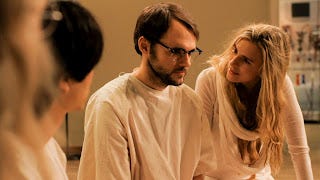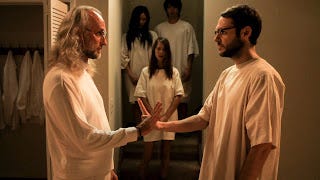Review: Brit Marling astonishes in powerful "Sound of My Voice"

Film Rating: A–
I took my fair share of flack of writing a negative review of Sean Durkin’s acclaimed “Martha Marcy May Marlene,” and even more when I later named it one of the ten worst films of 2011. The reason for my distaste remains simple: I feel it is an empty film, lacking a single intelligent or insightful thing to say about the nature or effects of cults beyond ‘they’re scary and scar people mentally.’ I gained not one iota of wisdom about cults or psychological damage watching the film, and when that is the admitted focus of the piece, I see no reason to label it as anything other than a failure. Tackling challenging subject matter is one thing; it takes bravery, but not necessarily quality, and I feel many critics and viewers responded to the former. To actually take a stance and say something meaningful about a difficult concept takes entirely different, far greater level of insight and clarity.
This is what Zal Batmanglij achieves with the terrific “Sound of My Voice.” It is, to my mind, the film many viewers believed “Martha” was. Both deal with issues surrounding shady, potentially dangerous cults, and though “Voice” has a unique sci-fi element, it cuts much deeper into what it means to give oneself over to a community one can never entirely understand, and the reasons why someone might wish to do so. In the process, it leaves both the characters and the audience dazed, bruised, confused, and uplifted in equal measure. It is, in short, an unforgettable experience. Continue reading after the jump...

This is primarily due to the stellar work done by star/co-writer Brit Marling, who grips the viewer in a tight, warm, disturbingly comforting embrace from the moment she appears on-screen, just as her character, Maggie, does to the members of her mysterious suburban cult. Maggie claims she has travelled back in time from the year 2054, and offers salvation from a harsh, apocalyptic future to those willing to follow her teachings. Her cult meets at night, when the rest of the world is asleep; members must shed their clothes, cleanse themselves thoroughly in the shower, dress in simple white robes, and be blindfolded for transport to Maggie’s secret location. There, she tells stories, answers questions, sings, and engages her followers in difficult demonstrations of faith.
The followers do all this because she is, in a word, transfixing. It takes nary two lines of dialogue for Marling to demonstrate why a person would devote themselves entirely to Maggie, for through her performance, the character is made beauty incarnate. Not just in her looks, but in her soft, gentle speaking patterns; in the way she weaves even the harshest of messages into words of encouragement; in her eyes, which pierce deep into the most painful parts of one’s soul with a healing gaze; and most importantly, in the complete calm and trust created in her presence, an atmosphere so enveloping that it is unthinkable any of her words might be false. Marling does not play a character who achieves these things: she performs such awe-inspiring feats herself, practicing Maggie’s methods of persuasion and faith-building on the audience. It is not just accepted, watching Marling, that this person could easily create a loyal cult; it is positively terrifying to know that if we encountered Maggie in real life, we would probably follow her just as easily as the film’s characters do.

This is the profound insight “Sound of My Voice” reaches that few, if any films have ever suggested: that scorn and fear them as we might, cults may not be reserved for the weak or fragile. They can draw absolutely anyone in, so long as the leader is magnetic and masterful enough to exploit the emotional damage – vast or slight – that we all carry in our hearts. The film’s main character, Peter, does not intend to be drawn under Maggie’s spell. He and his girlfriend, Lorna, are compiling a documentary about Maggie’s cult, and have joined for research. He is a relatively healthy person, all things considered. Yet even he cannot deny what Maggie offers: a comforting sense of unconditional love and stability he has not found anywhere else. To the rational mind, that level of acceptance could of course be a powerful weapon, one to stay far away from; to someone deeply accustomed to Maggie’s presence, though, the thought of losing such love would make even the extremist of lengths palatable.
With Marling’s crushingly brilliant performance demonstrating all this, the audience becomes just as crucial to the film’s thematic equation as Peter. Your reaction to Maggie will inform how you interpret every inch of the film, and if she cuts you as deeply as she did me, I suspect you will walk away tremendously unsettled. Time travel is, as mentioned above, a concept discussed here, but if you are averse to science fiction, don’t let that scare you away. The idea is merely Maggie’s hook, the astonishing story one must take a leap of faith to believe. All cults, and many religions, are based around fantastical concepts, which is why ‘faith’ and ‘belief’ are so crucial to such institutions. This is the force that binds and inspires, and “Sound of My Voice” wisely gives no concrete answers as to the truth of Maggie’s claims. She very well could be from the future. Or she might not be. That is up to you to decide, and once again, it will ultimately come down to how you react to Marling’s work.

With subject matter this complex and thematic ambitions this high, “Sound of My Voice” is bound to be an imperfect experience, and indeed, its occasional missteps are notable. The first act has difficulty with exposition, especially when it comes to Peter and Lorna’s backstory; the film essentially stops, turns to the viewer, and reads a page or so of writer’s notes on who these people are. The moment isn’t just inorganic, but robs a later, crucial encounter between Peter and Maggie of some of its power, as we’re already aware of the secrets Peter hides. The third act, meanwhile, plays with the audience’s perception of Maggie a tad too much, but ambiguity is restored in the final sequence, and the film is stronger for it.

Yet just as Maggie’s followers are able to look past the implausibility of time travel to find meaning in her presence, it’s easy to overlook the film’s lows when the highs are so very stunning. “Sound of My Voice” is a truly revelatory experience, one that forces the viewer to reconsider many preconceived notions about the nature of cults, faith, and human frailty. Its impact lingers long after one leaves the theatre, and though it is certainly not for the faint of heart, I hope it finds an audience who will recognize it for its remarkable accomplishments.
“Sound of My Voice” is currently playing at the Landmark Mayan in Denver, and in limited release nationwide.

